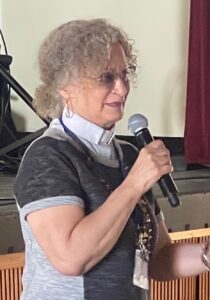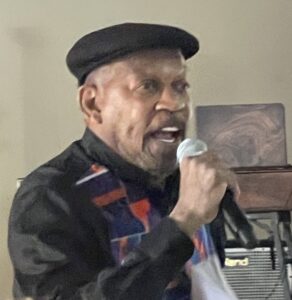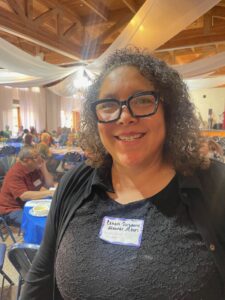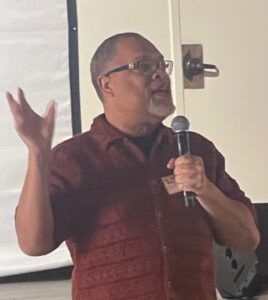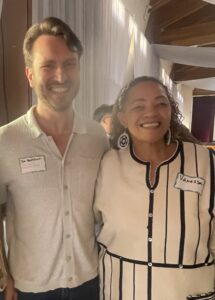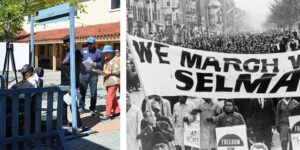
Remembering 1965 Selma civil rights march: (at left) parishioners cross bridge into parish hall at St. George’s, Laguna Hills. Photo by Jean Klein. (At right) In Harlem, a 1965 march in solidarity with Selma protesters. Library of Congress photo.
Singing out in call-and-response April 5, an interfaith congregation crossed a blue wooden bridge linking the patio of St. George’s Episcopal Church, Laguna Hills and its parish hall to evoke the 1965 experience of civil rights marchers trekking from Selma to Montgomery, Alabama.
“On this bridge they stood so strong; facing fear they marched along,” the Rev. Canon Pat McCaughan, vicar of St. George’s, chanted in a powerful voice met by those of more than 100 attendees. “Beaten down but not defeated, their courage keeps our hearts repeated. We stand for justice; we stand for right; we walk in justice; we march in light. The fight’s not over; the dream lives on. Together we rise; together we’re strong!”
Among presenters sharing at the South Orange County interfaith event was the Rev. Willie Sargent, retired pastor of Irvine’s Bethesda Baptist Church, who had marched with Dr. Martin Luther King Jr. in the 1960s and experienced the brutal beating back of Birmingham, Alabama, protesters by infamous Sheriff Bull Connor.
Sargent was first to share a reflection in the afternoon’s program titled “Remembering Selma Then: We March Now!” The gathering occurred concurrently with “Hands Off” protest marches held from coast to coast to decry U.S. policies being implemented by the Trump administration.
“Just as we came together then, we come together now to oppose injustice,” Sargent said between program segments featuring music of the “Trust 1” gospel trio and documentary video segments including footage from the Bloody Sunday crossing of the Edmund Pettus Bridge on March 7, 1965 which opened new strides in securing voting rights.
The commemoration began with outdoor stations titled “I Can’t Breathe” remembering men — especially Jimmie Lee Jackson in 1965 and Eric Garner in 2014 — who have died at the hands of police officers; “Fight for Democracy” paying tribute to Bloody Sunday victims and urging congressional representatives to adopt the John Lewis Voting Rights Advancement Act; “Have Mercy” honoring the Rev. James Reeb fatally beaten in 1965 and George Floyd killed in 2020; and “Say Her Name” recognizing women of African descent killed by law enforcement, as well as 1965 survivor Ruby Sales whose life was saved by Episcopal seminarian Jonathan Daniels.
The litany of women’s names included Kendra James, Pearlie Golden, Renisha McBride, Janet Wilson, Aiyana Stanley-Jones, Sandy Guardiola, Geraldine Townsend, Sandra Bland, Breonna Taylor, Morgan Rank London, LaTanya Haggerty, Atatiana Carr Jefferson, Miriam Carey, Sonji Danese Taylor, Korryn Gaines, Alberta Spruill, Pamela Shantay Turner, and Layleen Cubilette-Polanco.
“Today’s gathering helped us build bridges of connection,” said the Rev. Vanessa Mackenzie, rector of the Episcopal Church of the Advent in L.A.’s West Adams district, who made a 60-mile drive to join in the commemoration. “A bridge is a symbol which shows us that the purpose of a journey is to connect,” said Mackenzie, a veteran South African-born priest who was active in the anti-apartheid movement. “Connection is vitally important now, when this country is so divided in terms of race, gender, economics, and opinion.” She praised the parish for creating an event “rich in diversity, oneness of spirit, and so much love and good food,” pointing to the hallmark of hospitality for which the Laguna Hills congregation is well known.
Canon Suzanne Edwards-Acton, co-chair of the diocesan Program Group on Black Ministries, said the Laguna Hills event was especially meaningful for her contrasted against the backdrop of the day’s “Hands Off” protests elsewhere. “I purposely planned not to go protest today, but to come here instead for this meaningful experience.” Noting that 92% of black women voted for Kamala Harris, Edwards-Acton said many supporters need time to re-group. “The whole black community is really saying, ‘You know what, we were there. We showed up for the vote, we showed up trying to help people understand what was about to happen, and people voted against our interests.’”
Born in Orange County, Edwards-Acton, who now resides in L.A., said the Laguna Hills gathering also provided her a sense of “home-coming” to share in “something so beautiful and uplifting” and honest about “what has happened for Black people in the United States.”
The Rev. Guy Leehmuis — rector of St. Luke’s in the Mountains, La Crescenta, and chair of the H. Belfield Hannibal Chapter of the Union of Black Episcopalians in the Diocese of Los Angeles — said in closing remarks that it is important to remember: “This is not 1965. You will never go back to 1965. We learn from it, but it’s worse now because there are more people who have a stake in the crisis. There are different issues that are pushing and pulling on all of us. There are more people who have children who are interracial, and the race issue is far more complicated….
“Many people in this country are not voting,” Leemhuis added, pointing particularly to the incarcerated, the majority of whom are people of color. Plus, “there is a significant minority of this country that wants to go back to a time of some six decades before….
“What we have to do in 2025,” he said, involves “organizing is at the dinner table, at the country clubs, and the social clubs where your friends are…. Many of them are broken and fearful for a variety of reasons, but if we can maintain a level of action and love, we may find our way through this mess into a better day, but it starts with all of us, with simple conversations over the dinner table, to remind people who they are and Whose they are.”
Among other faith leaders participating in the gathering were Atilla Kahveci, vice president of the Pacifica Institute which specializes in interfaith and intercultural dialogue particularly engaging Islamic heritage; Rabbi Karen Sherman, director of spiritual life at Heritage Pointe Living Community; and Jean Tschohi Quinn, chair of the Baha’i Spiritual Assembly of San Clemente.
Community leaders sharing in the commemoration included Luis Aleman, a political and legislative staff member of the Orange County Labor Federation, and Tim Hartshorn, a Pitzer College professor who is executive director of the South County Cross-cultural Council and Dayworker Center in Laguna Beach.
“In these times, it’s understandable and OK to be scared,” Hartshorn said. “But we need to move beyond fear.”

